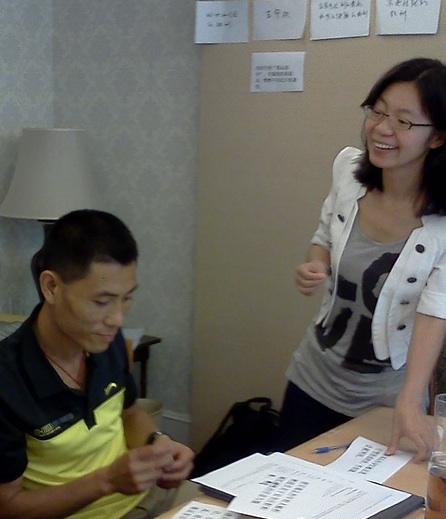Shen Tingting, a prominent HIV/AIDS and human rights advocate in Beijing, China, has been working with marginalized communities since her college days. In 2007, she, along with Li Dan, co-founded the Korekata AIDS Law Center. Until 2012, she was the deputy director of its parent organization, Dongjen Center for Human Rights Education and Action [https://www.dongjen.org/]. At Dongjen, she founded and managed an outreach program for sex workers in Beijing after she earned her masters from Renmin University in Social Welfare in 2009. Currently Tingting is a visiting research fellow at Asia Catalyst.
Tingting has written and advocated on a range of rights-related HIV/AIDS issues, including testing and confidentiality, compensation for victims of China’s blood disaster, and the rights of sex workers and drug users. She is the author of a new report on HIV testing and human rights in China,
Real-Name Testing: Is China Ready? and previously conducted research to co-author a major bilingual human rights report,
China’s Blood Disaster: The Way Forward. Her articles have also appeared in the HIV/AIDS Law and Policy Review.
She will present a poster on compensation for China’s HIV blood disaster on Tuesday, July 24th from 12:30 to 2:30pm and will speak in several other sessions. In the run-up to this year’s International AIDS Conference, AIDS 2012, Tingting sat down with Asia Catalyst to chat about her work.
请向我们介绍一下你的工作?
Please tell us about your work.
过去几年我一直在惟谦艾滋法律中心工作。这是中国第一家为艾滋病感染者提供法律援助服务的中心。我们主要面向感染者和易感人群提供免费的法律服务和咨询,也组织律师培训,帮助社区了解法律权益。我们也出版一份季刊—-《惟谦》,向国内读者介绍艾滋病法律的最新进展。
For the last few years I have been working for the Korekata AIDS Law Center. It is the first AIDS center providing service for people living with HIV/AIDS (PLWHA) in China.
We basically provide free legal services and counseling to PLWHA and also organize and train lawyers to help people from the community understand their rights under the law. We also have a quarterly magazine, Korekata Magazine; it is about the development of AIDS law.
今年2月到8月,我作为亚洲促进会的访问学者。对于我来说,这是一个很好的机会。我可以认识新朋友,并有时间做一些研究。这对我很有助益。最近我研究了
实名制艾滋病检测问题。在中国,这个问题非常有争议。这份报告将在
2012年的世界艾滋病大会期间发布。我也在和Fordham大学的一名法律学生一起研究中国的药物可及性问题。这个问题也非常重要。
This year, from February to August, I have been the research fellow at Asia Catalyst. It has been really exciting and a great opportunity for me. I am taking some time to meet new people, and get some research done. It is a really just a good thing for me. Recently I conducted research on
Real Name Testing in China, a widely debated topic in China, and I am happy that it was published in time for
AIDS 2012. I am also working with a Fordham Law student to research treatment access in China, which is another important issue.
请问你是怎么开始这项工作的?
How did you get involved in this work?
我最开始的时候是作为一名实习生在机构里工作。我帮忙组织国际会议,协助律师调查案件。
I started as intern in 2007, which was when Korekata was just getting started. I helped to organize an international conference to assist lawyers on litigating AIDS cases.
我一直对边缘群体很感兴趣。从心底里我对性工作者、毒品使用者或其他的边缘群体并不歧视。我想这可能是因为在大学的时候我学习的是社会学。在我看来,这些人群都是社会的一部分。
I have always been very interested in marginalized populations. It’s just that in my heart I don’t discriminate against sex workers, drug users, or other marginalized people in society. I think it’s because I studied sociology in college. These people are part of our society.
为什么要参加世界艾滋病大会?
Why do you want to attend AIDS 2012?
哈,我很期待这次大会,很高兴能和来自全球的活动家共聚一堂。大部分时候,我们都专注在各自的社区开展工作。大会提供了一个绝佳的机会,让我们和其他人分享经验,也看看他们都在做些什么,有哪些策略可以运用于中国。同时,艾滋病大会也是一个很好的平台,我们能够了解艾滋病领域新进展、预防工作的最佳实践,特别是以权利为基础的方法。
Well, it is really just exciting! I love learning about the other activists all around the world. Mostly we (activists) spend time just doing our work on the ground (in our own communities) so it is good to have a chance to share with other people and have a look at what they do and see what strategies we can use in China. Also, I think AIDS 2012 is a good place to learn about new research in the field of HIV/AIDS and best practices for prevention, especially rights based methods.
我参加了2010的维也纳世界艾滋病大会。那是一次很活跃的会议,我对当时的人权大游行印象非常深刻。几千人从维也纳市政府开始游行,要求用人权的方式应对艾滋病。会议期间,我看到了全球村的很多活动,认识了新的朋友,也建立了很多资源。
I went to the 2010 AIDS conference in Vienna. It was really dynamic conference and I was really moved by the human rights rally. Thousands of people marched across the city hall calling for human rights in the fight against HIV/AIDS. During the conference I saw a lot of activities in the Global Village- new resources, new people, and made a lot of new relationships.
你还有什么话想告诉我们的读者?
Anything you want to add?
在惟谦工作的同时我也建立了一个性工作者外展项目。我们每月干预200多名性工作者,还出版了国内第一本专门关注性工作者的杂志。我知道美国一直在全球的艾滋病应对中非常积极,在预防和治疗领域提供了很多支持。但我很失望地看到,性工作者没有办法参加这次大会。从全球来看,对性工作者的支持非常有限。这方面改进的空间还很大。
While working for Korekata I also started a sex worker outreach program. We reached 200 workers a month and published the first magazine exclusively for sex workers in China. I know the United States has been really active in the global fight against HIV/AIDS and has worked a lot in prevention and treatment and support, but I was very disappointed that sex workers have been banned from the International AIDS Conference. Support is really lacking for sex workers. It is definitely a place where there can be improvement.





